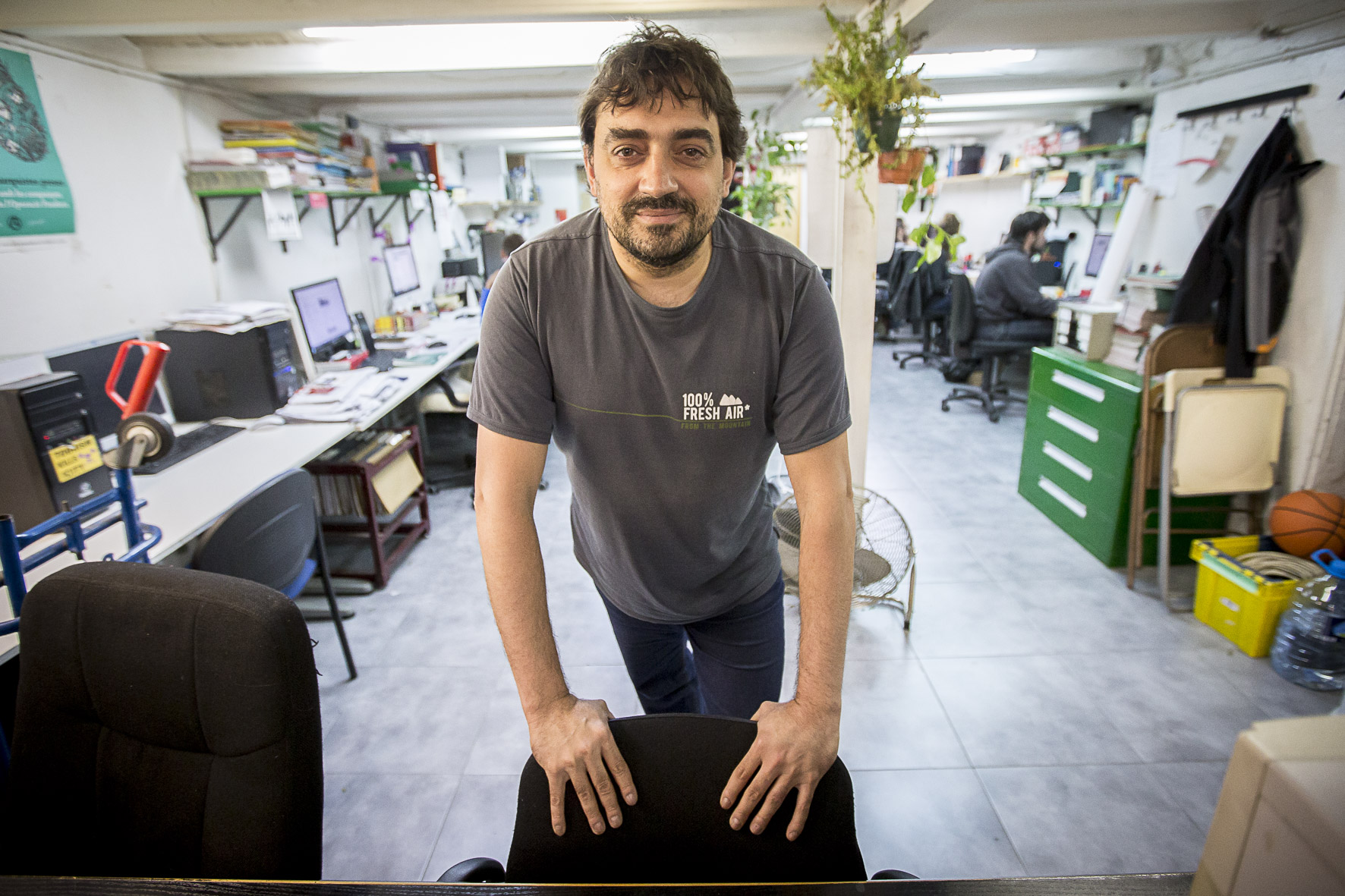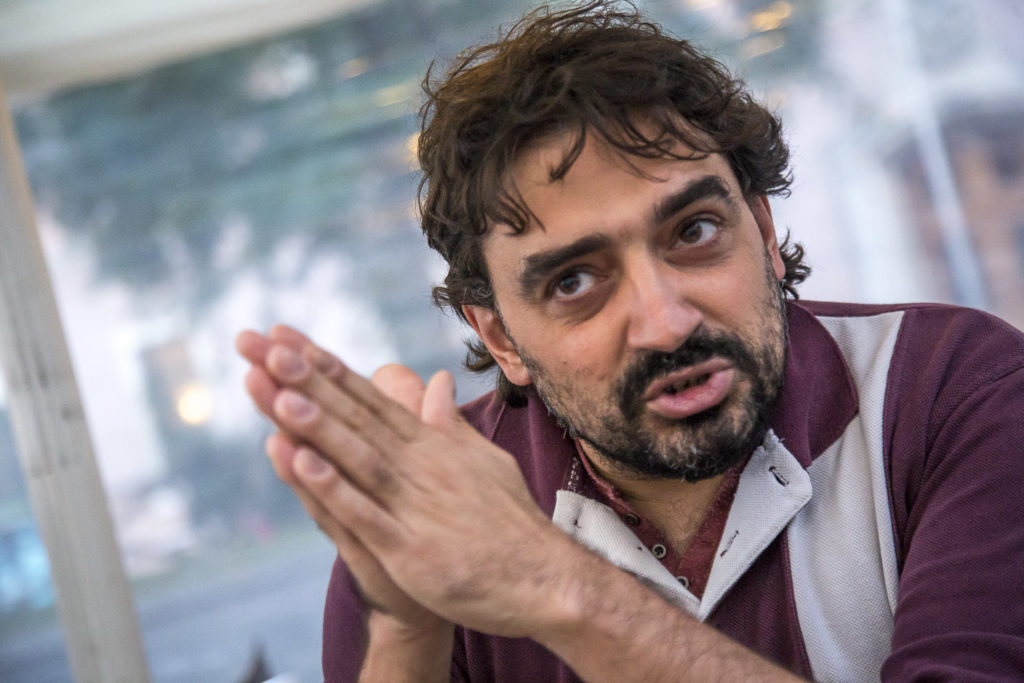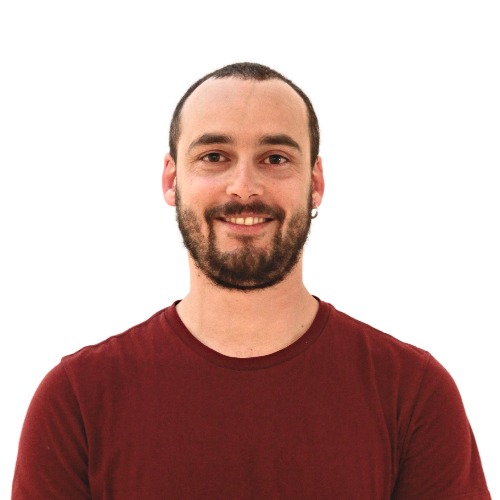13.04.2024 - 03:42
|
Actualització: 13.04.2024 - 03:45
Directa journalist Jesús Rodríguez is one of the new Catalan exiles in Switzerland following the judicial case for terrorism against the Tsunami Democràtic. The biased instruction of Judge Manuel García-Castellón has driven him to seek refuge in Geneva, where he has received support from more persecuted individuals and has had contacts with UN rapporteurs. “This is a general political case and it makes no sense to try to defend ourselves in a judicial setting,” he explains to VilaWeb.
Rodríguez does not reveal what his defense will do, but he recalls that last April the judge assured him that he was not under investigation, after the publication of an article that stated that in the Spanish newspaper El Mundo. Furthermore, he denounces the game played by the PP, Vox, and the Spanish judicial leadership to advance the case without any scruples, a strategy he defines as “the Basque template.”
He also laments the normalization of espionage and interception of private communications to persecute journalists, politicians, and activists. “In one of these WhatsApp messages, curiously, the word ‘Puigdemont’ appears, and it serves to accuse me and at the same time to point out Carles Puigdemont as a member of Tsunami,” he adds.
—It’s been four months since you’ve been in exile. How are you?
—It’s going well. I’ve been fortunate to arrive in a country and a city where there are more long-standing exiles. I’ve had the solidarity of Anna Gabriel and Marta Rovira and the company of Ruben Wagensberg and Oleguer Serra. It’s been an arrival in company, and that has helped us a lot to establish ourselves vitally, find housing, and do all the administrative and bureaucratic procedures, which have not been easy. It’s been weeks of work, but we’ve done it collectively and helped each other. That has been important. We’ve also found a lot of solidarity from committed people living in Switzerland, from movements, organizations, and spaces that have supported us. And it’s worth noting because in Catalonia, this is very unknown.
—How has it personally and professionally affected you?
—The first few months the situation was a bit of expectation, to see how the judicial case evolved and whether the judge dared to take the step of summoning us to Madrid for questioning or not. This uncertainty has lasted from November until now, but we did decide to leave the country to start preparing the ground in case our situation needed to be consolidated. This allowed us to stabilize before the summons arrived. Last week we received a preliminary communication, that is, the request for location: to give an address, which I understand the judge does with all the intention of knowing where we are physically. This order was addressed to us and to the Spanish Civil Guard. This is the last straw that broke the camel’s back, and we have decided to make our exile public and reaffirm it as a definitive decision until there is a secure resolution with the amnesty law.
—Why did you decide to leave at New Year’s?
—It was just after the submission to the Supreme Court, the reasoned statement that Judge García-Castellón sent [which led to the court keeping the investigation of president Puigdemont and ERC member of parliament Wagensberg]. When he did that, he gave clear indications that he intended to continue the case beyond the approval of the amnesty law and even if the law was approved in congress. Moreover, we have seen that as modifications and negotiations were made to the wording, he surgically adapted the content of his resolutions to ensure that the Tsunami case was not covered by the amnesty. With all this strategy, accompanied by Vox in court and the PP in the Senate, we see clearly that it is a general political case and that it makes no sense to try to defend ourselves in a judicial setting.
—And why Switzerland?
—Geneva is home to multiple human rights organizations, but also to the defense of freedom of expression and journalism. In addition, Switzerland’s history regarding the Catalan issue is important.
—What actions have you taken while in exile?
—I can’t go into details because they are initial contacts, but I can confirm that we have already contacted UN rapporteurs, both in the area of abusive use of anti-terrorism legislation and the right to information and freedom of expression. This will bear fruit. We are working on it ourselves and with organizations that accompany us. In addition, we are preparing an international campaign in defense of civil, political, and journalistic rights. It is work that Òmnium, Irídia, and Novact have been doing for years, and now it will receive a new boost with the arrival of the new exiles.
—Is there coordination among all those repressed in the Tsunami case?
—There is contact and coordination regarding our establishment in Switzerland. There is contact and coordination among those indicted in this case. We have met, talked, shared our needs, our perspective, and the decision each one would make. In addition, there is contact between our lawyers to coordinate legal strategy inside and outside the country.
—You are accused of having prior information about the Tsunami protests.
—It’s all very absurd. None of the actions that appear in the case, in a context of separation of powers and respect for fundamental rights, would have been carried out. We are facing the free activity of a journalist, a politician, a human rights activist… But what do we find in the Spanish state? The label of terrorism is placed on a protest in the streets of Catalonia during the fall of 2019, and this means that any movement, any communication, any activity related to those events is scrutinized under the lens of collaboration with terrorism or contact with a terrorist organization, according to them, the Tsunami Democràtic. From there, they unleash and end up applying the Basque template to the protests in Catalonia. All of this enters into a surreal, absurd dynamic that makes no sense.
—In your case, it arises from a WhatsApp message extracted from Josep Lluís Alay’s phone.
—We say it almost normally, right? That messages are extracted from mobile phones, that communications are intercepted, but this is very serious. We have normalized that the Civil Guard has accessed hundreds and hundreds of mobile phones to extract information. In one of these communications, in one of these messages, curiously, the word ‘Puigdemont’ appears, and it serves to charge me and at the same time to point out Carles Puigdemont as a member of the Tsunami. They use it for both purposes.
—What did the message say?
—This message referred to the fact that there would be protests, that there would be roadblocks, events… These are pieces of information that I could have due to my activity as a journalist, in my contact with my sources. They were data that hundreds of journalists in Catalonia had at that time and could share with whomever they wanted.
—Do you think Catalan journalism is aware of what this judicial abuse means for the sector?
—There is a part of journalism that is aware of it and another part that is not. We are also too entrenched in the position of each media outlet, and therefore there are ideological and political directives that dictate everything. There are journalists who, even though they work in newsrooms where they are not aware of this situation, try to open a gap and raise a series of alerts about what is happening. But there are also others who do not. It also depends on each person’s personal circumstances. But we are talking about a judicial case for terrorism where the names of twenty-six journalists appear, without having been indicted, but pointing them out for collaborating with the Tsunami because they received information from their sources and disseminated it. This is the democratic quality with which the Civil Guard works. And beyond that, there is another very serious fact.
—Which one?
—The intercepted communications, the mobile phone messages, which appear in the Civil Guard reports of journalists, but also of politicians and activists, have been transcribed and dumped into the judicial case. And Judge García-Castellón has handed them over to Vox. I think that is the best explanation of the bias in the Spanish judicial leadership. How is it allowed that an absolutely prospective investigation against journalists, politicians, and activists ends with the delivery of all personal and political information to Vox? The judge and the far right work hand in hand.

—A year ago, García-Castellón denied investigating you.
—Last April, an article appeared in the newspaper El Mundo saying that I was one of the people under investigation in the case. Following this, I contacted the National Court through my lawyer, I submitted a document that was registered in the instruction court 6 and that was responded to by Judge Manuel García-Castellón. I have a response signed by him, stating that I am not one of the people under investigation. This response arrived just after the lifting of the secrecy of the investigation.
—And what changed?
—On November 6, he received a report from the Civil Guard that implicated me, implicated Carles Puigdemont, and more people who were not even investigated in April. When you read the description of the events made by the Civil Guard, which the same judge later adopts, you see that the charges against some of us are necessary to build the narrative that points to others investigated, and especially Carles Puigdemont. In the thread of messages incorporated into the final report, if the word ‘Puigdemont’ had not appeared, they probably would not have had any evidence to charge me.
—Formally, have you received a notification that you are being investigated?
—I have not received any formal communication from the National Court. I only have the response from the judge from April 2023. Subsequently, I have received information, but no notification, because I am not a party to the case. When they tell me that I am not being investigated, last April, they do not allow me to become a party to it and I live with peace of mind. Despite the reports and press articles pointing fingers at me, until last week only one thing had arrived with my name, which is the location order issued by the judge to the Civil Guard and communicated to me by other lawyers who are involved.
—Will you appear now?
—My lawyer is considering whether to appear in order to have access to the proceedings and see all the movements. Now, what I will not do is give my address to the judge. I tell him that he is wasting his time if he looks for me at my home in Barcelona or at the Directa office. He can save himself the trouble, because I’m not there. I will not give him my address, obviously, because it will end up in the hands of the far-right Vox. I have no interest in that.
—What will you do if you are summoned for questioning?
—It is a decision that will have to be made at the specific moment and according to the circumstances of the moment. I cannot foresee right now what the final decision will be, because many things can happen. It could happen that this summons arrives when the amnesty law has already been published in the Official State Gazette, it could be when a prejudicial question has been raised to the Court of Justice of the European Union or there is an appeal from our defenses against the non-application of the law. There are many hypotheses, the range is very wide, and it makes it very difficult to make predictions about what may happen from now on. I can only say that, in any case, we have left the country to defend ourselves in freedom and to establish a strategy from abroad. When these summons arrive, we will assess and make a decision with our lawyers.
—What do you think of the instruction of the case since November 6?
—It is evident that García-Castellón and Marchena work in the service of the PP and Vox. In any democratic state, they would be judged for prevarication. If you explain it to Swiss or other European lawyers, if you show them the statements and public positions of these characters… It would have caused a deep crisis in the leadership of the judicial power. In Spain, this does not happen. The General Council of the Judiciary applauds them, rewards them, and protects them. In a scenario like this, there are no other options, you can only fight from abroad. Everything that has happened with the case, for me, is predictable. García-Castellón and Marchena act as battering rams of the right and the far right. They do nothing more than materialize the needs of this political space in the judicial case of the Tsunami.
—Have you felt monitored or followed in recent months?
—I have not been aware of it. There is also no order in the judicial case to infect my mobile phone, nor legal interception of my communications through the SILC system [Legal Interception System of Telecommunications] of the National Police and the Civil Guard, as it does appear with other people. I have not detected the presence of any spyware in the past year, but I have received suspicious messages. I have also had the perception of a certain pressure, surveillance, and observation by plainclothes agents and the Civil Guard.
—Do you trust in the application of the amnesty law?
—It is not ruled out, it is even predictable, that some of the judges at the top of the Spanish judicial power may commit prevarication, that is, they may try to sabotage the application of the amnesty law. In principle, with the current wording, we are covered and that is how lawyers and organizations throughout Europe read it. However, here comes the interpretation made by the judges. García-Castellón and Marchena read it their way, with political bias, from their position as magistrates serving a cause. This means that we cannot have any guarantee. It happens with the Tsunami, Operation Judes, and practically all cases related to the process.
—Do you not consider any possibility of returning?
—I cannot return until there are guarantees, and this will come either through the direct application of amnesty or through the application in second place, that is, in response to the prejudicial that the judges may present to the CJEU, or through a possible appeal by the defenses to the Constitutional Court. Each scenario has different deadlines. It could be this summer, in the case of direct application, but it could take over a year or a year and a half if it goes through the courts.
- More news in English, at VilaWeb
- All the news, in Catalan



